News 2019
Throughout the first quarter of the ongoing year, shipping companies reported 119 pirate attacks and armed raids to the Piracy Reporting Centre of the International Maritime Bureau (IMB). This is less than the previous year. The German Flag offers seafarers and shipping companies comprehensive support with prevention and coping with piracy raids.
From January to September 2019, 95 ships were boarded, ten shot at, ten attacks were successfully warded off and four ships were hijacked according to the IMB. During the same time of the preceding year, shipping companies had reported 156 piracy attacks.
The Golf of Guinea is rated a high-risk area for piracy and armed raids. According to statements of the IMB, 86 percent of hostage-takings and almost 82 percent of abductions of crew members worldwide occur in this region. The IMB is especially concerned about the rising readiness to apply armed force. More about this on the website of the International Chamber of Shipping.
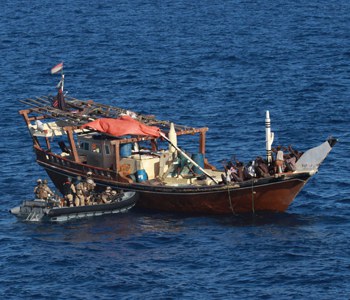
In its piracy report for the first half of 2019, the Federal Police of Germany elaborates on individual situations in the active zones. The authors of the report describe not only piracy occurrences but also existing protection measures in the areas concerned. During the first half of 2019, six ships of the German merchant fleet, also including ships temporarily flying a foreign flag, were attacked by pirates.
According to the Federal Police, piracy in Latin and South America is on the rise. In this context, the piracy report goes into detail about an attack on a German-flagged container ship in Ecuador in April. Close to the Isla Escalante, the ship was shot at from a speedboat. Another boat tried to attach a grappling hook to the side of the ship but failed. The attack was aborted. The coast guard and port authority were informed. No one was injured, but the ship was slightly damaged.
The German Flag offers seafarers and shipping companies information and support with prevention as well as with coping with stressful piracy experiences:
- At www.deutsche-flagge.de/en under the heading "Security levels · Warning notes", there is current information about threatened sea areas, notices of security levels and guidance on recommended behaviour.
- In its Piracy Prevention Centre, the maritime department of the Federal Police offers advice to German shipping companies on how to best avert piracy attacks. The police officers offer lectures, seminars and workshops on the topic as well as individual consultation and trainings.
- The BG Verkehr offers their members quick and professional help with its "Trauma-Lotsen" who help to work through incidents of extreme magnitude such as the attack on a ship by pirates. In order to give advice and lend support to persons concerned as well as to their supervisors from member companies, the BG Verkehr has trained its staff as so-called "Trauma-Lotsen" (trauma pilots). These "Trauma-Lotsen" are locally available in the District Councils. They are contact person, can give competent advice, know of treatment options and suitable therapists.
Notice of the USCG regarding possible data loss with "BilgMon 488"
Notice of the USCG for oil content meters type "BilgMon 488 "
The USCG published a notice regarding a possible data loss with oil content meters type "BilgMon 488" of the manufacturer Brannstrom Sweden AB.
If you use this device on board, please take notice of the statement of the USCG.
On 18 September, the promised policy of the Federal Government to financially aid ships of traditional build has entered into force. Owners of traditional ships will soon be able to apply for financial support at the "Bundesanstalt für Verwaltungsdienstleistungen" (BAV) for the continued safe operation of their ships.
Ships of traditional build are objects of national value in Germany and are part of its maritime tradition. Because traditional ships carry people, the level of safety is important. In this regard, the Federal Transport Ministry issued new requirements for the construction, equipment and manning of traditional ships. The intention of the Federal Government with its newly published financial aid scheme is to aid owners of traditional ships in their safety investments and create an incentive for a swift implementation of the new requirements.
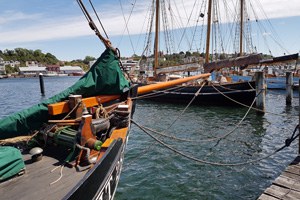
Owners of traditional ships will soon be able to apply for financial support of their projects at the "Bundesanstalt für Verwaltungsdienstleistungen" (BAV). The BAV will publish the respective application form on their website (www.bav.bund.de). The applications will be processed electronically via the system "easy-Online", but applications will additionally have to be submitted as hardcopy with a signature.
Eligible for the aid will be any expenses that have become necessary under the new requirements that have entered into force on 14 March 2018 with the "Verordnung zur Änderung der schiffssicherheitsrechtlichen Vorschriften über Bau und Ausrüstung von Traditionsschiffen und anderen Schiffen, die nicht internationalen Schiffssicherheitsregeln unterliegen" (Ordinance amending ship safety provisions on the construction and equipment of ships of traditional build and other ships which do not fall under the international ship safety rules and regulations). Expenses in relation with existing rules are not eligible for this funding.
An application will be successful if the owner of the traditional ship arranged the renewal survey by the BG Verkehr within the usual time frame of this periodic survey. The survey report shows which new requirements may be funded. Along with the application, the shipowner has to submit cost estimates for the implementation of the requirements. If all required documents have been submitted, the Federal Government can support the planned conversion measures as a "Fehlbedarfsfinanzierung" (i.e. the amount is dependent on the expense as well as the financial capability of the applicant).
The details of the funding are given in the funding policy.
Questions about the application process will be answered by the BAV staff:
Bundesanstalt für Verwaltungsdienstleistungen (BAV)
Schloßplatz 9, 26603 Aurich
Phone: 04941/602-678 (Montag bis Freitag im Zeitraum 9:00 Uhr bis 15:00 Uhr)
Fax: 04941/602-81799
E-mail: Traditionsschiffe@bav.bund.de
Questions about surveys and requirements of the Ship Safety Ordinance will be kindly answered by the Ship Safety Division of BG Verkehr:
BG Verkehr / Ship Safety Division
Brandstwiete 1, 20457 Hamburg
Phone: 040/361 37-239 (Ms Oya Sönmez)
E-mail: oya.sönmez@bg-verkehr.de
On 17 and 18 October, experts and policy makers discuss the United Nations' International Convention on the Law of the Sea (UNCLOS) and its future at the International Tribunal for the Law of the Sea (ITLOS) in Hamburg. The organizers of the event are Indiana University's Hamilton Lugar School of Global and International Studies, the University of Hamburg and the International Foundation for the Law of the Sea. There are still spots available for the conference.
25 years ago, the United Nations adopted the International Convention of the Law of the Sea. To mark this occasion, an international UNCLOS Conference is held in Hamburg. UNCLOS stands for United Nations Convention on the Law of the Sea.
The venue for the conference is the International Tribunal for the Law of the Sea at Hamburg-Nienstedten. The white old-fashioned villa and the new building in a spacious park with view on the river Elbe house Germany's only international court of law. Since 1996, 21 judges of the Tribunal for the Law of the Sea have delivered judgements on disputes over the interpretation of the Convention of the Law of the Sea.
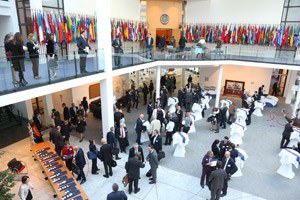
The convention was developed in 1994, after nine years of negotiations as a reaction to a long lasting dispute about the size of the area of the coastal waters. These kinds of issues become more and more important because many countries use marine resources and want to increase the size of their fishing and oil production areas. 165 states have so far ratified the convention; incidentally, the USA are not among them.
Major aspects of the Convention of the Law of the Sea are the determination of a 12 nautical mile zone as coastal waters as well as a continuous 12 nautical mile zone. The coastal waters are territorial waters, which means that the coastal state is able to punish violations. In the continuous zone, the state can decree customs, health or immigration provisions. The convention also deals with rights and duties within the Exclusive Economic Zones (EEZ) as well as the exploitation of the high seas and the ocean bed.
At the conference in Hamburg, experts will review the current state as well as discuss the future of the Convention of the Law of the Sea. During the first day of the conference, the dispensation of justice regarding the usage of the sea areas and the settlement of disputes will be considered. The most prominent speaker of the day will be former US Secretary of Defense Chuck Hagel talking about the practical application of the Articles (altogether 320) of the Convention. Directing the focus onto the future, the second day features issues such as changes of marine policies as new technologies emerge.
Find out more under https://hls.indiana.edu/unclos/
In the course of the National Masterplan for Maritime Technologies (NMMT), the Federal Ministry for Economic Affairs and Energy together with the Free Hanseatic City of Bremen invites to a symposium in Bremerhaven during 23-24 October 2019. At this symposium, enterprises and authorities from various countries of Europe present their projects of maritime safety and security technologies.
Already a day before the actual commencement of the notes and presentations, on 22 October at 4 pm, a live demonstration at the outside area of the Forum Fischbahnhof marks the beginning of the symposium. This live demonstration will be open to visitors throughout the two-day symposium. The event addresses the achievements and challenges of digital ship safety and security.
The first day of the symposium is about how digitalization is utilized in marine traffic monitoring, management as well as logistic chains, about maritime infrastructures in ports, on ships and of waterways, and about innovations for safeguarding and protecting for example coastal and offshore installations. Enterprises and public authorities will present their projects in connection with these themes. For the evening of the 23rd October, the Senator for Economic Affairs, Labour and Europe of the Free Hanseatic City of Bremen invites the participants to a reception at the "German Immigration Centre" in Bremerhaven.
During the morning session of day two, risks and tasks of cyber security will be discussed. The speakers and participants will focus on digital avenues in environmental protection and the future of digital safety and security issues.
The symposium is part of the National Masterplan for Maritime Technologies (NMMT) of the Federal Ministry for Economic Affairs and Energy. With this masterplan, the coordinator for the maritime economy of the Federal Government Norbert Brackmann has set up a concept for the advancement of the maritime economy. As part of the Maritime Agenda 2025 of the Federal Government, the NMMT will depict the innovation and development requirements of the maritime sector.
The symposium takes place in English. Registration and the programme can be located on the website of the NMMT by the Federal Ministry of Economic Affairs and Energy.
Validity of MED certificates during the current transitional period and after
The United Kingdom left the European Union on the 1st of February 2020. Because of the agreed transitional period until the 31st of December 2020, for now there will be no legal changes for products that have to comply with the EU Marine Equipment Directive .
The Maritime & Coastguard Agency (MCA) published transitional rules for the conformity assessment as well as recognition of marine equipment on board ships flying a European flag in case of a "No-Deal-Brexit".
This year at the IMO is all about equality of women, because, even today, of the 1.2 million seafarers only 2 percent are female. The International Maritime Organization utilizes this year's theme to raise awareness of its various initiatives and programmes to empower women in the maritime sector and promote this crucial topic.
This year's World Maritime Day of the International Maritime Organization IMO is set for 26 September 2019. To celebrate this day, the authorities of the German coastal states hoist the state flag.
Every year the World Maritime Day focuses on a relevant topic. This year is dedicated to the major topic "Empowering women in the maritime community". Throughout the year, various events and campaigns incorporate the awareness-theme.
At the beginning of April, the World Maritime University held an international conference about women in the maritime industry. On the Day of the Seafarer on 25 June, the IMO gained wide social media attention with their slogan „I am on board with gender equality‟. Now, in September, a parallel event in Colombia accompanies the theme of the World Maritime Day and expands on it.
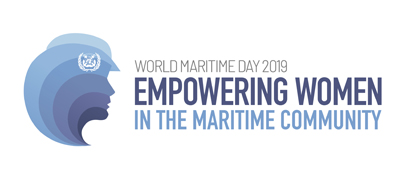
Already at the end of the 80s, IMO started to support the integration of women in the maritime sector. Over several phases, it created the necessary framework conditions to get more women interested in work at sea. The goal has always been for more women to visit maritime training facilities and subsequently spent work experience time on board.
The IMO has gender-specific fellowships, facilitates access to high-level technical training for women in the maritime sector in developing countries and promotes the advancement of women in maritime authorities. In their programme "Women Maritime – IMO's gender programme" under the slogan "Training – Visibility – Recognition", IMO joins the agenda of the United Nations to implement the fifth of the seventeen sustainable development goals "to achieve gender equality and empower all women and girls". With their initiative, the IMO aims to overcome prejudices against women in maritime professions, to open up training opportunities to women and to facilitate female careers in technical and nautical professions at sea and at land.
Under IMO's auspices, seven regional maritime associations for women that want to strengthen employment opportunities in the shipping industry have been established. Reducing cultural stigmata and prejudices remains a challenge in their attempts. Only two percent of the 1.2 million seafarers worldwide are women. Of this already small proportion, most women work in the cruise industry.
Find out more about the IMO's gender programme "Women in Maritime" and the World Maritime Day 2019.
The Jens-Peter and Betsy Schlüter Foundation for Shipping and Environment holds an international symposium on the issue of "Anthropogenic Underwater Noise" on 10 September 2019. Top-tier experts from international organizations and academic institutions will report about the sources and impacts of underwater noise caused by humans and discuss with the audience how the noise might be reduced.
There are many sources of noise underwater: on the one hand, natural sounds like the wash of the waves or communication sounds of marine animals, on the other hand, sounds created by men. The underwater noise that is caused by merchant ships is significant and can harm marine wildlife, especially marine mammals. Ship propellers, but also on-board machinery, generate a constant sound in the water. This disturbs the communication and echo localisation of the animals among each other as well as of other objects which can lead to collisions. According to the Federal Agency for Nature Conservation underwater noise has doubled every decade over the last 35 years.
On an international symposium supported by the IMO this increasingly important environmental topic becomes the focus. On 10 September 2019 experts of various maritime areas engage with the phenomenon of noise in the sea. In the morning and early noon experts will report about the sources and impacts of anthropogenic underwater noise. In the afternoon, the focus lies on the exploration of solutions: How can the underwater noise caused by humans be reduced?
The symposium is held in English. For more information, the programme and registration refer to the website of the foundation.
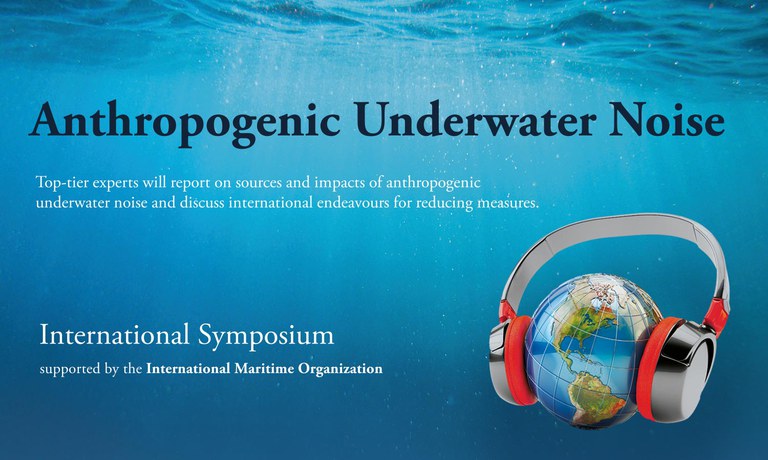
Germany has acceded the Ship Recycling Convention of the IMO as 13. State world-wide and seventh EU State. However, several other states will still have to ratify the Hong Kong Convention 2009 in order for it to enter into force.
In July 2019 Reinhard Klingen, head of the department Waterways and Shipping of the Federal Ministry for Traffic and Digital Infrastructure (BMVI), presented the IMO Secretary-General Kitack Lim with the instrument of accession. By depositing the instrument with the IMO, the binding accession of Germany to the Hong Kong Convention concludes.
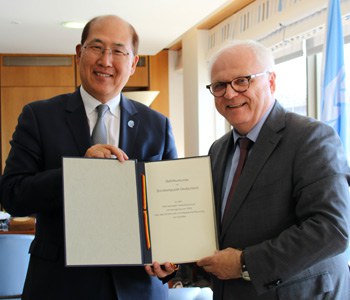
Currently the Hong Kong Convention is not in force. For it to enter into force, 15 states with at least 40% of the world merchant shipping tonnage and not less than 3 % of the combined maximum annual ship recycling volume need to join. With Germany's ratification almost 30 % of the world merchant shipping tonnage has been reached. The 3%-criterion, however, can only be fulfilled if India or other countries with large shipbreaking yards like Bangladesh and Pakistan accede.
More than 32 % of ships worldwide get recycled in India. Over the last years, India has invested heavily in the improvement of its ship recycling infrastructure. Since then the IACS, International Association of Classification Societies, has confirmed that many of the ship recycling facilities now meet the requirements of the Hong Kong Convention.
In spite of Germany's recent ratification, the Hong Kong Convention is not yet applicable for ships flying the German flag. Only when the Hong Kong Convention has entered into force will it become fully effective.
In accordance with the EU Ship Recycling Regulation (Regulation (EU) No. 1257/2013), existing ships from 500 GT entering an EU port (outside of their own flag state) need to carry an approved inventory of hazardous materials at the latest on 31 December 2020. Surveys confirm the inventory of hazardous materials on a regular basis. A certificate stating that the ship is ready for recycling is required before the ship enters, as is required, one of the recycling facilities on the European List (last updated 18 June 2019). New ships must already comply with the requirements.
Fixed gas fire-extinguishing systems
The Maritime Safety Committee (MSC) of the International Maritime Organization IMO has adopted a revised version of MSC.1/Circ.1395/Rev.3. The Ship Safety Division would like to notify about this revised version - MSC.1/Circ.1395/Rev.4 of 13 June 2019.
The updated circular, which supersedes the previous, contains "Lists of solid bulk cargoes for which a fixed gas fire-extinguishing system may be exempted or for which a fixed gas fire-extinguishing system is ineffective".
In this publication an overview of the cargoes for which an exemption - subject to terms as appropriate - is granted in accordance with Regulation II-2/10.7.1.4 SOLAS (International Convention for Safety of Life at Sea).
Your contact for this topic is
Andreas Herold
Dienststelle Schiffssicherheit / BG Verkehr
Brandstwiete 1
20457 Hamburg
Tel.: +49 40 361 37-258
Mail: andreas.herold@bg-verkehr.de
The revised Guideline on Food Hygiene give practical guidance and helpful procedures to make sure food is handled hygienically and safely on board of ships.
A well-balanced and healthy diet is important, especially when working hart. On board ships on weeklong voyages, it is necessary to plan ahead and store and prepare foodstuffs appropriately. That way, what ends up on the plate not only tastes good but is also healthy and wholesome.
The Guidelines on Food Hygiene by the Ship Safety Division of BG Verkehr explain in step with actual practice what is part of hygienic food provision on board. It presents comprehensively what the shipowner, the master and the galley and service personnel can and must do to make sure that the way food is stored and prepared does not pose hazards or health risks. Therefore, the main topics of the guidelines are clean drinking water, correct storage and hygienic preparation, which are key to achieving this.
Photos and illustrations depict how to do it properly and what needs to be avoided. Newly added annexes show how to wash the hands properly and how to keep the galley workplace clean and safe. A useful checklist helps control safe food storage and preparation on a regular basis and self-dependently.
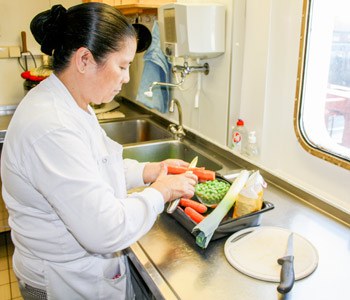
More than 30 representatives of the European and North American port state control (PSC) authorities have followed the invitation of the BG Verkehr to get together for a three-day seminar in Hamburg. The surveyors and coordinators caught up on the recent challenges for port state control.
The representatives of the PSC authorities of the area covered by the Paris Memorandum of Understanding on Port State Control (Paris MoU), which include the European states as well as Russia and Canada, get together twice a year for working seminars. This year Germany was host of this seminar.
The focus of this train-the-trainer seminar was the upcoming Concentrated Inspection Campaign of the PSC with the topic "Emergency Systems and Procedures" which is planned for September until November 2019. The PSC officers of the Ship Safety Division of BG Verkehr and their foreign colleagues discussed uniform procedures for the campaign.
The three-day session conducted in English was complemented with guest lectures on the tasks of the German Central Command for Maritime Emergencies (Havariekommando), on experiences with hybrid ferries, on rescue of persons over board from the sea and on ballast water management.
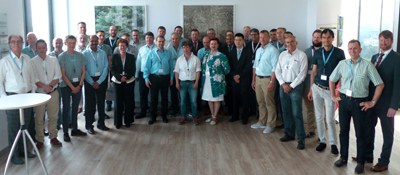
With its "Day of the Seafarer" on 25 June, the International Maritime Organization IMO draws attention to 1.2 million seafarers worldwide and their interests. This year the day is themed "gender equality". The IMO arranges their campaign mostly in social media. Some seamen's missions celebrate this day together with the seafarers.
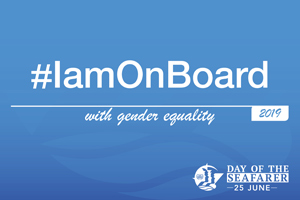
This year the maritime world is dedicated to women. And such the World Maritime Day makes Empowering Women in the Maritime Community the subject of discussion. The motto of the Day of the Seafarer on 25 June takes up this topic too: "I Am on Board with gender equality". The IMO calls to participate under the hashtag #IamOnBoard on their presences on Twitter, Facebook and Instagram and to witness interactively how the community picks up this topic. Another way to participate is offered on the IMO website where suggestions to achieve gender equality in seafaring can be made on a virtual wall.
Some seaman's missions also seize the Day of the Seafarer as an opportunity to draw attention to the hard work of seafarers with events to celebrate them. For example: the Seamen's Mission Cuxhaven organizes a barbeque party from 5 pm (rsvp until 21 June cuxhaven@seemannsmission.org) and the Seaman's Mission Bremerhaven throws a party at the Seamen's Club Welcome from 5 pm with a game of basketball cheered on by the local cheerleader team and food off the barbeque.
From 1 August, the BG Verkehr will survey ships under a foreign flag requiring a Certificate of Equivalence in German ports only. One reason being that the amount of surveys has escalated, another is the large expenditure of travel time to and from ports abroad.
Every ship without SOLAS certificates for international voyages only operating in German coastal waters requires a Certificate of Equivalence of BG Verkehr. This is supposed to ensure a comparable safety standard to German-flagged ships in coastal shipping. In practice, mostly offshore transfer vessels need a Certificate of Equivalence. The legal basis for the certificate is the Ship Safety Ordinance section 9 paragraph 6.
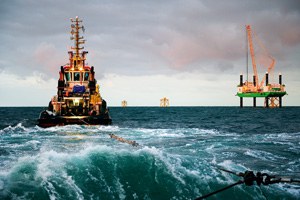
The BG Verkehr only issues Certicates of Equivalence after a survey on board the respective ship. The amount of surveys has escalated in recent years. In 2015/2016 the surveyors of the BG Verkehr left from Hamburg to 47 equivalence surveys – from January 2017 until June 2019 this number has risen to ten-times as many to 433 surveys.
In view of the unchanged number of surveyors as well as expenditure of travel time to ports abroad, the BG Verkehr will offer equivalence surveys in German ports only from 1 August. This change of survey practice regards both initial as well as renewal surveys.
Reflective close proximity clothing must meet EN 1486 or ISO 15538
Close proximity clothing for fire fighting as maritime equipment in accordance with the European Marine Equipment Directive 2014/90/EU (hereinafter MED) must successfully undergo a specified conformity assessment procedure ("EU approval") prior to their supply on the European single market and their subsequent use on board an EU ship as defined by the MED.
The relevant testing standards for the conformity assessment procedure stem from the provisions of the current implementing regulation of the European Commission on design, construction and performance requirements as well as testing standards for marine equipment. In the implementing regulation – which is currently regulation (EU) 2018/773 – the testing standards EN 469(2005), EN 1486 (2007) as well as ISO 15538 (2001) are listed under item "MED/3.3 Fire-fighter's outfit: protective clothing (close proximity clothing)".
A ruling on 20 October 2017 (under the number 3 Bf 152/16) of the higher administrative court of Hamburg has bindingly found that for reflective close proximity clothing and close proximity clothing with a reflectiveouter surface only the testing standards EN 1486 or ISO 15538 are to be applied in a MED conformity assessment procedure. The testing standard EN 469 is not pertinent and therefore may not be the basis of an "EU approval procedure".
Reflective close proximity clothing, which has solely been tested in accordance with EN 469, lacks the proper conformity assessment procedure and the proof that the clothing conforms with the applicable legal requirements for the product and may therefore be indicated as MED conform and bear the wheel mark.
All economic operators , manufacturers and distributors in particular, are legally obliged to ensure that they are not responsible for any reflective close proximity clothing solely tested with EN 469 to make it available as a MED conform product on the German market and consequently used.
The BSH, as the competent market surveillance authority explicitly reserves the right to take the regulatory measures against the economic operators concerned in case an infringement of the legal prohibition is established.
Market surveillance department is at your disposal in case of any questions.
Bundesamt für Seeschifffahrt und Hydrographie
Bernhard-Nocht-Straße 78
20359 Hamburg
Marktüberwachung / market surveillance
Mail: marktueberwachung@bsh.de
Ingolf Eckert
Phone: +49 40 3190-7110
Fax: +49 40 3190-5000
Mail: ingolf.eckert@bsh.de
In our section on "Environmental protection", the current information is given about requirements regarding the discharge of wastewater from passenger ships in the Baltic Sea.
With the Flag State Performance Table of the International Chamber of Shipping (ICS), shipowners can get a quick overview of the quality of the 117 flag states worldwide. The German Flag has long been exemplary in all areas and once more ranks among the best this year.
In their Flag State Performance Table, the ICS publishes a concise overview of how well the flag states organised their fleet over the last year. The performance table helps shipping companies choose a reliable and safe flag.
In the ICS ranking, a green marking represents positive performance of the individual criterion while a red one stands for failure of performance. Just as in the previous years, the German Flag is fully in the "green". Thereby, Germany in one of 22 of the best flag states among a total of 117 the ICS compared.
Germany has ratified all important maritime conventions and works actively in and with the IMO. German-flagged ships come off well in port State control inspections and the average age of the fleet is relatively low. The recognized organisations working for the German Flag also show good results. On the STCW "White List", Germany stands for high-quality training of the next generation of seafarers and assures fair working and living conditions on German-flagged ships.
It remains valid: You can rely on the quality of the German Flag!
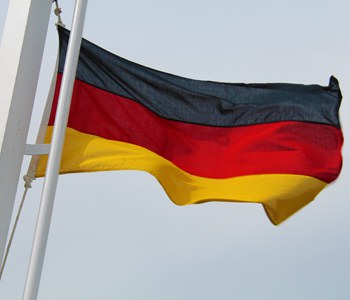
02/2019: Safety notice regarding fire extinguishers by the manufacturer Eversafe Extinguisher SDN BHD
The manufacturer Eversafe Extinguisher SDN BHD has published a safety notice regarding possible corrosion damage with the extinguisher models
- Brude EEF-9s and
- Brude EEW-9s.
The serial numbers of the models potentially affected are known. Please note in particular, the advice of the manufacturer on page two regarding the annual service and restrictions regarding sunlight and heat.
Convincingly establishing safety awareness on board can only work if all crew members are actively involved. Hazards can be found anywhere safety provisions are only followed half-heartedly. With their new Safety Bulletin, the Ship Safety Division of BG Verkehr gives practical advice for sound safety awareness on board.
The first topic in line of the new Safety Bulletin is Enclosed Spaces. In the beginning of the notice, an example from day-to-day work on board shows how and where hazards may occur. Because, especially when something is done on a daily basis, carelessness easily creeps in. Moreover, the examples show with real incidents where potential weak spots of the occupational health and safety measures of specific operational procedures lie.
The safety information is published as a bulletin, because a convincing and successful safety concept needs to be continuously further developed. The bulletin issues are supposed to instigate to always question and advance the existing occupational health and safety measures on board together. This means that crew and shipping company have to work together to ensure that safety measures are both suitable for every day work and at the same time meet the legal and company requirements. Where a safety measure proofs useless, a new way to implement safety needs to be developed together. Only if everyone supports the safety concept on board, will it be consistently implemented.
Read more about how to raise safety awareness on board under our heading "Occupational health and safety".
In its Annual Report 2018 on maritime labour rights, the Ship Safety Division of BG Verkehr shows at a glance how it monitored compliance with the provisions of the Maritime Labour Act over the last year. Since last year, the BG Verkehr has been issuing Maritime Labour Certificates and Fishing Labour Certificates electronically. The Ship Safety Division also published its MLC-Guidelines in a completely revised format.
Since 2013 the Maritime Labour Act implements the International Maritime Labour Convention (MLC) on ships under German flag. With these provisions, mandatory and comprehensive regulations regarding working and living conditions of seafarers have been established. Important topics like hours of work and rest, food and catering, payment of wages, occupational health on board and many more are now clearly regulated and are verified on a regular basis.
40 MLC surveyors inspect international ships abroad and nationally regarding their compliance with the requirements of the Convention for the Ship Safety Division of BG Verkehr. The employees of the ISM / ILO Department attend to complaints of seafarers about working and living conditions, approve private recruitment agencies and ensure that shipping companies under German flag are informed about current topics of this topic area. The ISM / ILO Department has now published its Annual Report 2018.
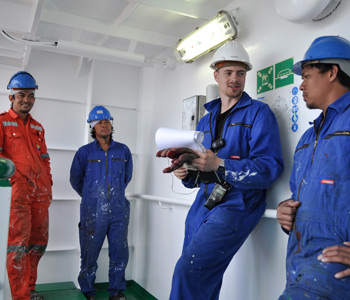
Since last year, the German Flag has been issuing Maritime Labour Certificates and Fishing Labour Certificates as electronic certificates. The validity of a ship certificate can be verified electronically with a certificate identification number on this website.
In the middle of the year 2018, the fully revised Guidelines on the implementation of the Maritime Labour Act on board of German flagged ships was published. Compared to its previous version, the experts of the Ship Safety Division completely revised the topic area health and safety protection and accident prevention. New information about drinking water on sea-going ships as well as maps of the trading areas for medical equipment were added. For the first time, the Guidelines contain specific information about contracts of employment and hours of work and rest for work on board fishing vessels.
With this QR Code, you can download the MLC Guidelines directly to your phone and have them at the ready whenever you need them:

The Ship Safety Division of BG Verkehr has changed their approval practice regarding in-water surveys of German-flagged ships. As of now, the inspection of the ship's bottom can also be done inside the water if a ship does not have an additional class notation for in-water surveys (e.g. "BIS", "IW").
Under the SOLAS Convention (Regulation I/10(a) in part B), two bottom surveys have to be conducted for sea-going vessels within a 5-year period. For cargo ships younger than 15 years, the first survey is not required to be done in drydock but can also be conducted in the water by a diver.
So far, the German Flag demanded an additional class notation (e.g. "BIS", "IW") or appropriate structural conditions for an in-water survey – among other things, fixed markings at the hull below the waterline and safe access to the sea chests, rudder bearings and stuffing boxes for the diver.
Other flag states or classification societies use the current IACS UR Z 3 Rev.7 of January 2018 (the abbreviation "UR" means "Unified Requirements"). The Ship Safety Division also has decided to follow these rules of the International Association of Classification Societies (IACS) for sea-going vessels under German flag from now on.
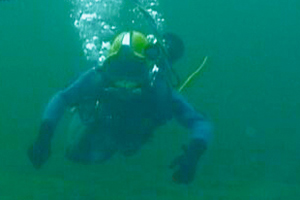
In-water surveys are, inter alia, approved under the following circumstances:
- survey in sheltered water, preferably with weak tidal streams and currents;
- the in-water visibility and the cleanliness of the hull below the waterline are to be good enough to permit a meaningful examination which allows the surveyor and the in-water survey firm to determine the condition of the plating, appendages and the welding;
- the diving survey shall be carried out by a company approved by the competent classification society under the supervision and to the satisfaction of the class surveyor;
- if damages are detected during the in-water survey, the class surveyor may order a drydock bottom survey.
Further details are outlined in:
The German Flag State Administration gets more and more digital. In addition to e-certificates, online application procedures and many other interactive applications on the website, the Hamburg shipping register, as the first shipping register in Germany, will become digital. A user-friendly and time-saving procedure will facilitate the registration of ships for the shipowners and the administration staff.
"Time is money" – this is especially true for the shipping industry, because any day that a ship is not in transit, it is costing the shipowner money rather than making it. So far a ship registration may take up to a week. During this time the documents are being processed, handed from one department to the next and are thoroughly checked legally.
To considerably reduce this bureaucratic effort, the Hamburg shipping register has decided to undergo a comprehensive digitalisation. On 1. January 2020, the first digital shipping register in Germany will be able to carry out registrations and register entry changes in less than half the time thanks to online applications, automatic processes, such as call sign designation and verification of double naming, as well as digital files.
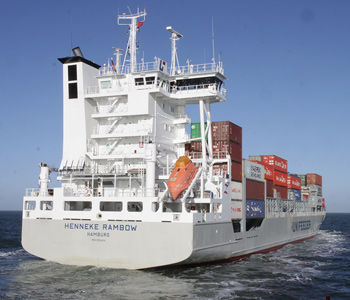
The Hamburg shipping register counts almost 7,000 entries of which 4,866 are of sea-going vessels. This makes it the largest shipping register in Germany. Last year it had 420 new entries and 3,500 applications for changes. The registration of a ship at the competent district court of the home port is required when a new ship is built or a ship changes flag. Applications for a change of the entry need to be filed when for example a ship undergoes a conversion or changes its name. The online application allows for a submission of the application forms independent of the opening hours of the authority from all around the world. It will also not be necessary to visit the shipping register personally for a file inspection, this can rather be done at one's own desk.
Some other shipping registers have already shown interest in this digitalisation project. The possible digitalisation of other shipping registers could facilitate a closer cooperation in the future. The digital shipping register will be a real gain for the maritime and legal location Hamburg and a valuable service for the shipowner.
In March of last year, the BSH tested the first maritime Galileo satellite navigation receiver worldwide to be used on board.
In March of last year, the BSH tested the first maritime Galileo satellite navigation receiver worldwide to be used on board for an EU approval. This receiver of the company Fugro Norway AS with the name Fugro Oceanstar had already been approved as a receiver for GPS and the Russian system GLONASS.
Aside from the real satellite environment, the BSH also used an extensive satellite simulation for the testing. The simulation facilitates the near optional combination of all signals available for civilian application of the satellite navigation systems GPS, GLONASS and Galileo. The approval after the completion of the testing was carried out by DNV GL Group.


